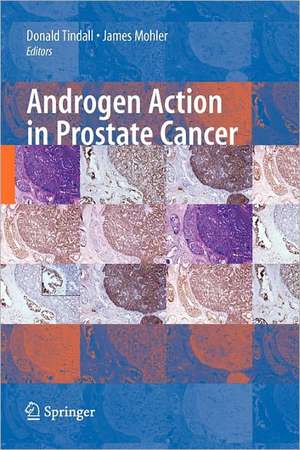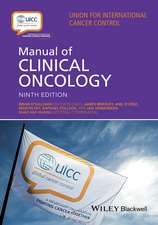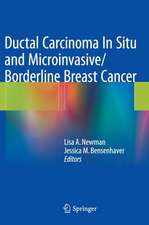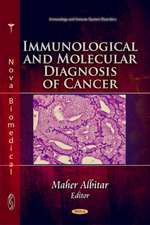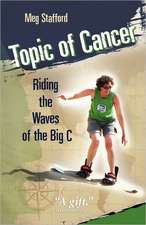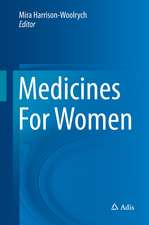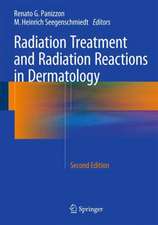Androgen Action in Prostate Cancer
Editat de Donald Tindall, James Mohleren Limba Engleză Paperback – dec 2010
Historically, the gene expression program mediated by the AR has been poorly understood. However, recent gene expression profiling and more traditional single-gene characterization studies have revealed many androgen-regulated genes that are important mediators of androgen action in both normal and malignant prostate tissue. This book will focus on the androgen-regulated gene expression program, and examine how recently identified androgen-regulated genes are likely to contribute to the development and progression of prostate cancer. Recent studies that have attempted to unravel how these genes are deregulated in androgen depletion independent prostate cancer will be included
| Toate formatele și edițiile | Preț | Express |
|---|---|---|
| Paperback (1) | 1123.69 lei 6-8 săpt. | |
| Springer – dec 2010 | 1123.69 lei 6-8 săpt. | |
| Hardback (1) | 1128.63 lei 6-8 săpt. | |
| Springer – 15 mai 2009 | 1128.63 lei 6-8 săpt. |
Preț: 1123.69 lei
Preț vechi: 1182.84 lei
-5% Nou
Puncte Express: 1686
Preț estimativ în valută:
215.09€ • 233.71$ • 180.79£
215.09€ • 233.71$ • 180.79£
Carte tipărită la comandă
Livrare economică 21 aprilie-05 mai
Preluare comenzi: 021 569.72.76
Specificații
ISBN-13: 9781441924049
ISBN-10: 1441924043
Pagini: 836
Ilustrații: VIII, 826 p.
Dimensiuni: 155 x 235 x 44 mm
Greutate: 1.15 kg
Ediția:Softcover reprint of hardcover 1st ed. 2009
Editura: Springer
Colecția Springer
Locul publicării:New York, NY, United States
ISBN-10: 1441924043
Pagini: 836
Ilustrații: VIII, 826 p.
Dimensiuni: 155 x 235 x 44 mm
Greutate: 1.15 kg
Ediția:Softcover reprint of hardcover 1st ed. 2009
Editura: Springer
Colecția Springer
Locul publicării:New York, NY, United States
Public țintă
Professional/practitionerCuprins
The Role of Androgens in Development of the Normal Prostate and Progression of Prostate Cancer.- Androgen Action and Modulation of Prostate and Prostate Cancer Growth: An Historical Perspective.- Clinical Progression to Castration-Recurrent Prostate Cancer.- Differential Roles of Androgen Receptor in Prostate Development and Cancer Progression.- Imaging Androgen Receptor Function In Vivo.- Androgen Metabolism.- Increased Expression of Genes Converting Adrenal Androgens to Testosterone in Castration-Recurrent Prostate Cancer.- Androgen-Metabolic Genes in Prostate Cancer Predisposition and Progression.- Effect of Steroid 5?-Reductase Inhibitors on Markers of Tumor Regression and Proliferation in Prostate Cancer.- 5?-Reductase Isozymes in Castration-Recurrent Prostate Cancer.- Improving Intermittent Androgen-Deprivation Therapy: OFF Cycle and the Role of Steroid 5?-Reductase Inhibitors.- Androgen Receptor Structure/Function Relationships.- Insights from AR Gene Mutations.- Functional Motifs of the Androgen Receptor.- The Role of the Androgen Receptor Polyglutamine Tract in Prostate Cancer: In Mice and Men.- The Androgen Receptor Coactivator-Binding Interface.- Co-Regulators of the Androgen Receptor.- Coregulators and the Regulation of Androgen Receptor Action in Prostate Cancer.- Androgen Receptor Coregulators and Their Role in Prostate Cancer.- Interaction of the Androgen Receptor Ligand-Binding Domain with the N-Terminal Domain and with Coactivators.- Multitasking and Interplay Between the Androgen Receptor Domains.- Chromatin Remodeling and Androgen Receptor-Mediated Transcription.- Ligand-Independent Activation of the Androgen Receptor.- Ligand-Independent Androgen Receptor Activity.- Role of IL-6 in Regulating the Androgen Receptor.- The Role of Cyclic AMP inRegulating the Androgen Receptor.- Role of the Androgen Receptor in Prostate Cancer during Castration.- Cellular and Molecular Signatures of Androgen Ablation of Prostate Cancer.- Tissue Levels of Androgens in Castration-Recurrent Prostate Cancer.- Unique Effects of Wnt Signaling on Prostate Cancer Cells: Modulation of the Androgen Signaling Pathway by Interactions of the Androgen Receptor Gene and Protein with Key Components of the Canonical Wnt Signaling Pathway.- The Role of Foxa Proteins in the Regulation of Androgen Receptor Activity.- Androgen-Regulated Genes during Prostate Cancer Progression.- Androgen Receptor as a Licensing Factor for DNA Replication.- Androgen-Regulated Genes in the Prostate.- Mapping the Androgen Receptor Cistrome.- Differential Regulation of Clusterin Isoforms by the Androgen Receptor.- Androgen Regulation of Prostate Cancer Gene Fusions.- Androgens and the Lipogenic Switch in Prostate Cancer.- The Androgen Receptor as a Drugable Target.- Molecular Biology of Novel Targets Identified Through Study of Castration-Recurrent Prostate Cancer.- Selenium and Androgen Receptor in Prostate Cancer.
Textul de pe ultima copertă
This book serves as a tribute to the work of the many investigators who have attempted to understand the role of the androgen receptor (AR) in the development and progression of prostate cancer. The relationship between prostate cancer and androgen status was initially appreciated in the late 1800’s, and then awareness reawakened in the 1940’s by the studies of Charles Huggins and colleagues, for which the Nobel prize was awarded in 1966.
The purpose of this book is to provide an up to date review of the molecular and cellular aspects of androgen action in prostate cancer. It includes an overview of the role of androgens in the development of the normal prostate and progression of prostate cancer. Our understanding of androgen metabolism and efforts to target androgen metabolism in the prevention and treatment of prostate cancer is presented. Androgen receptor structure/function relationships and the role of co-regulators are defined. Ligand-independent activation of the androgen receptor and the role of the androgen receptor during progression to the castration recurrent phenotype are discussed. Androgen-regulated genes are elucidated and their roles during prostate cancer progression are defined. Finally, the androgen receptor is presented as a viable target for novel therapies. Together, these reviews should give the reader a comprehensive conceptual framework of androgen action in prostate cancer.
The purpose of this book is to provide an up to date review of the molecular and cellular aspects of androgen action in prostate cancer. It includes an overview of the role of androgens in the development of the normal prostate and progression of prostate cancer. Our understanding of androgen metabolism and efforts to target androgen metabolism in the prevention and treatment of prostate cancer is presented. Androgen receptor structure/function relationships and the role of co-regulators are defined. Ligand-independent activation of the androgen receptor and the role of the androgen receptor during progression to the castration recurrent phenotype are discussed. Androgen-regulated genes are elucidated and their roles during prostate cancer progression are defined. Finally, the androgen receptor is presented as a viable target for novel therapies. Together, these reviews should give the reader a comprehensive conceptual framework of androgen action in prostate cancer.
Caracteristici
Book focuses on the androgen-regulated gene expression program, and examine how recently identified androgen-regulated genes are likely to contribute to the development and progression of prostate cancer Recent studies that have attempted to unravel how these genes are deregulated in androgen depletion independent prostate cancer will be included Includes supplementary material: sn.pub/extras
